Migrants were whipped by apparent people smugglers and a desperate mother with a baby hauled onto a dinghy amid extraordinary out-of-control scenes in France this morning.
The Mail beat French police to the shore at small-boat hotspot Gravelines beach at 5.30am, where large groups of migrants were running the mile down to the beach to reach the waves.
The group, all young men, were up to their knees in the water as a dinghy emerged from a canal into the sea, and turned back to the shoreline towards them.
Only then did four Police Nationale officers appear at the water’s edge – but they strictly applied the rule that they will not touch migrants or boats in the water, through fear of causing harm.
So as the ‘taxi-boat’ dinghy pulled nearer, already half-full with previously collected passengers, the migrants on the beach were able to climb aboard unhindered.
But in what appeared to be a measure of harsh crowd control, to prevent the 30-foot rubber boat from capsizing, a people smuggler’s assistant in the water repeatedly whipped migrants with a cane if they tried to climb on too fast.
The scenes further illustrate Labour’s abject failure to protect Britain’s borders.
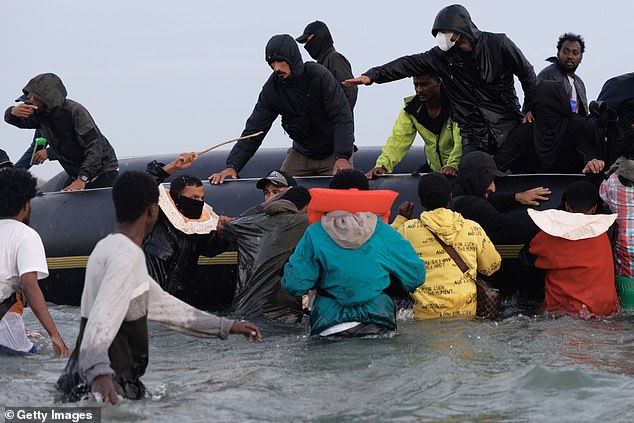
A masked ‘trafficker’ was seen brandishing a cane and tugging on the jacket of a migrant as they tried to scramble on board off Gravelines, France, this morning
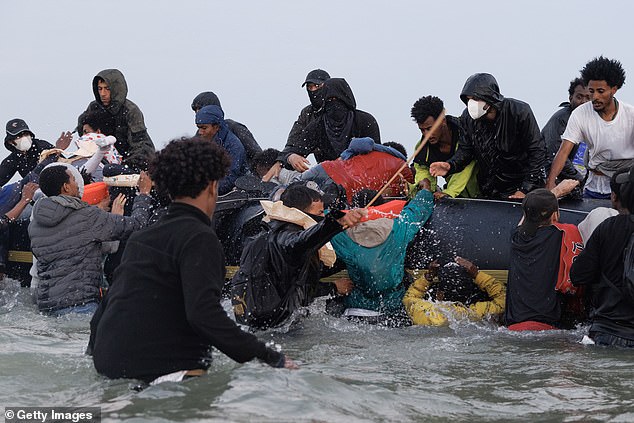
Cane poised, an alleged trafficker tried to manage the scene as the desperate migrants heaved themselves onboard while one seems to have slipped under
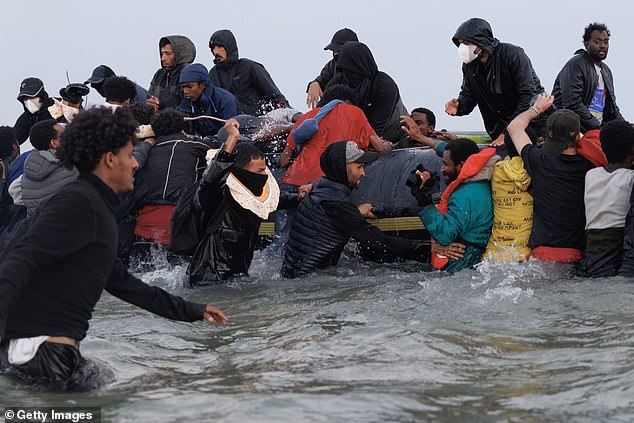
One terrified migrant was seen cowering as the masked thug with a rubber ring around his neck brandished the long stick
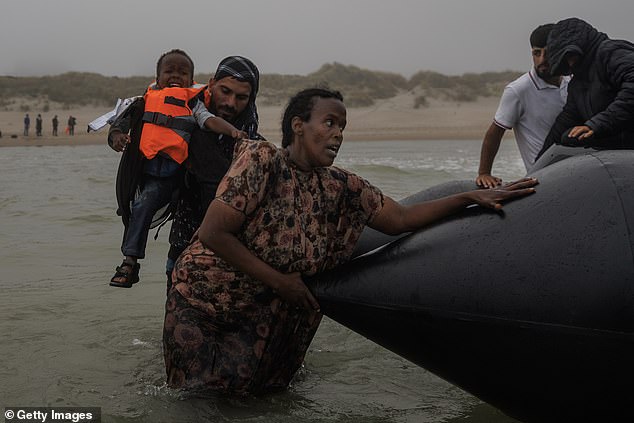
A second boat arrived later this morning – this time, the migrants waiting to climb aboard were not young men, but vulnerable mothers with babies and small children
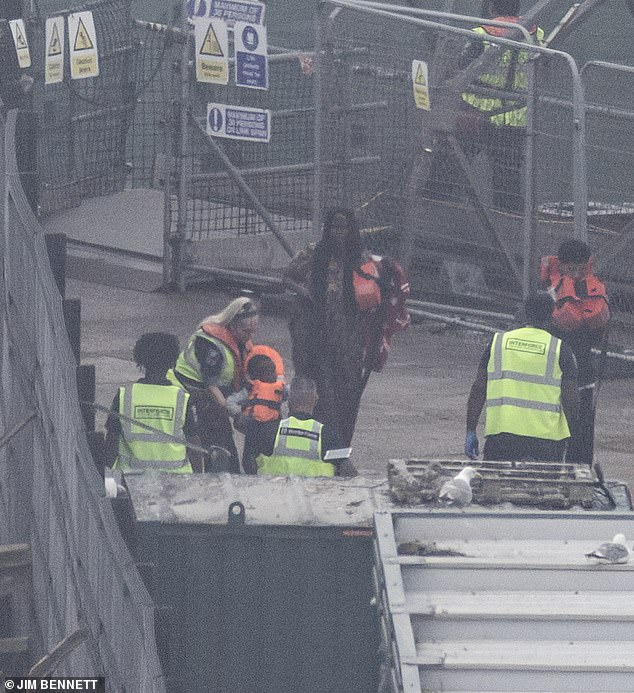
The mother and her child (pictured above) successfully made it to Dover after their dinghy was picked up by a Border Force vessel
A total of 20,422 migrants have arrived in the UK after crossing the Channel so far this year, with 440 arriving on Tuesday, Home Office figures show.
It is a milestone not reached until mid-August in previous years with small-boat arrivals up by 48 per cent on the same period in 2024.
The landmark, reached this week, comes almost exactly a year after Labour took power and scrapped the Conservatives’ Rwanda asylum deal, which was designed to deter migrants from mounting perilous Channel crossings.
Astonishingly, this morning, while the four officers watching with dry boots only interacted with the migrants by using their phones to video them, they did question just two men – your reporter and photographer.
They demanded identification documents, and photographed them, before telephoning our names and employer to HQ. Asked why they were quizzing us and not the migrants, one officer replied with a question: ‘Did you come here because you had advance information?’
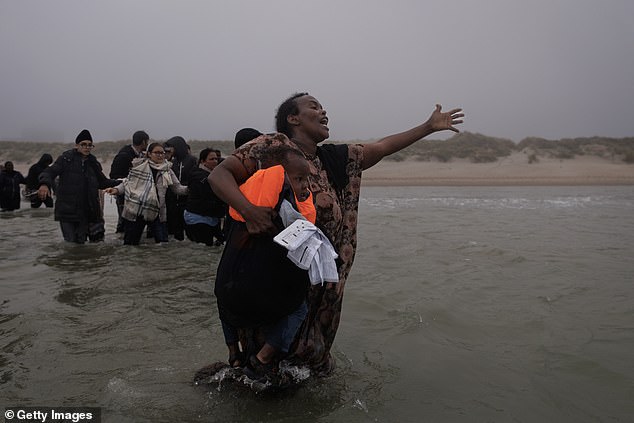
One hysterical woman, clutching her screaming toddler wrapped in a life vest to her breast, made a break for the already overloaded dinghy
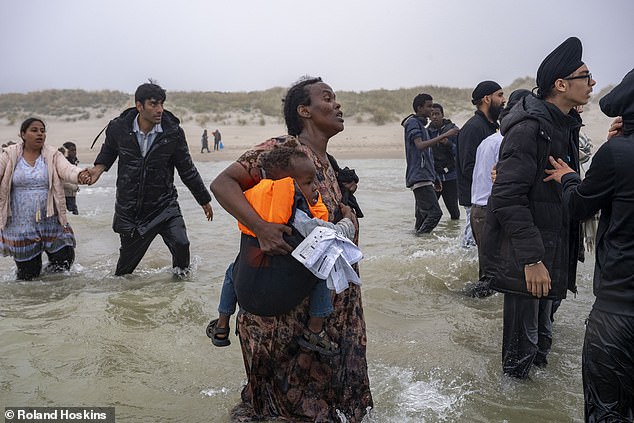
The panicked woman tried to dash through the choppy waters to reach the small boat
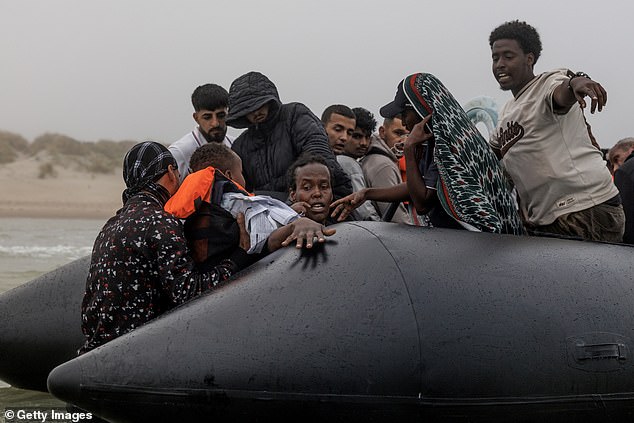
The woman then tries to board from the back of the boat with a man holding her young child
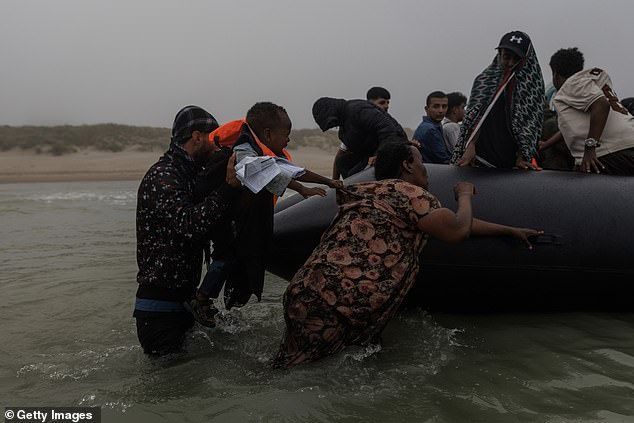
She clambers around the side as one person onboard reaches out to help – in tow, the screaming child who tugs on her top
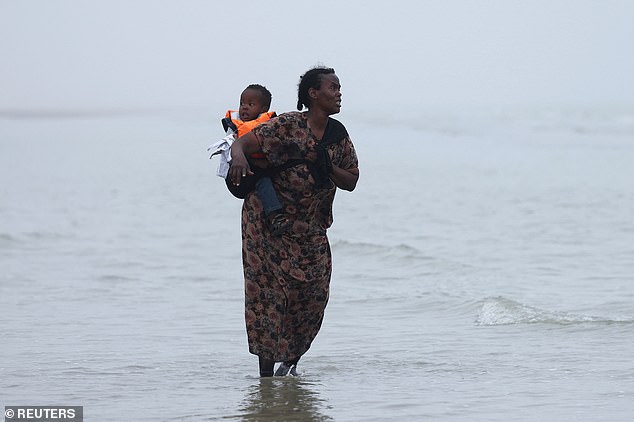
The woman was seen wandering the shore line earlier waiting for the small boat to take her across the Channel
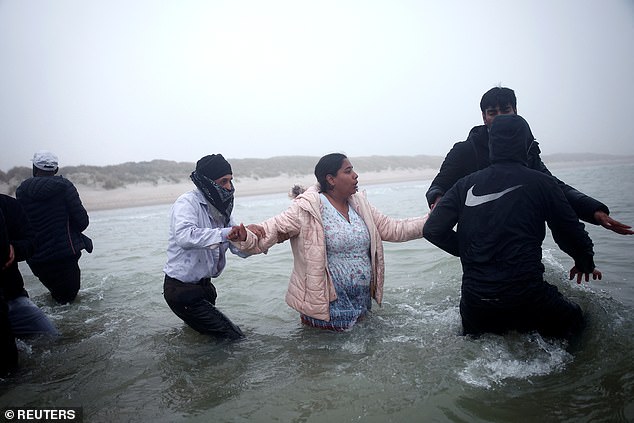
Wearing only socks, the mother with her baby strapped to her back in a life jacket dashed to the boat when it arrived

A family of migrants walk through the water to reach an inflatable dinghy but did not make it in time
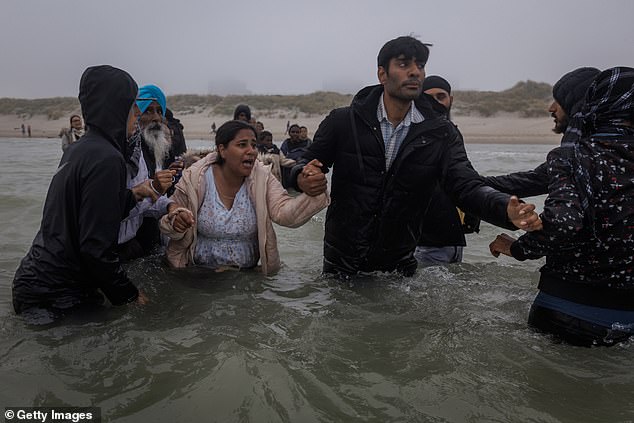
The dinghy promptly motored away from the shore, leaving wailing families who missed their chance to board standing helpless in waist-deep saltwater in heart-rending scenes
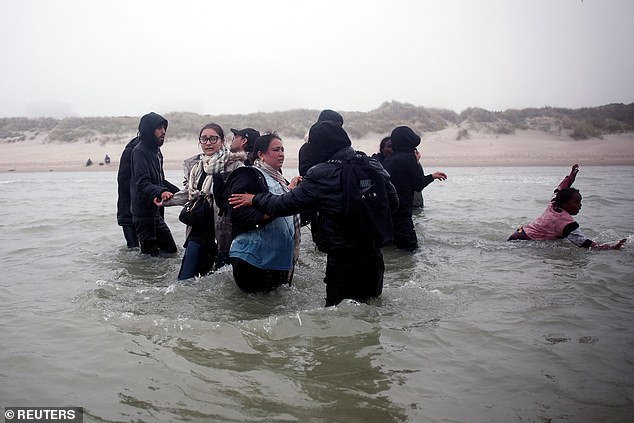
An alleged trafficker appears to turn a woman away and a family from boarding the small boat as a small child trips and falls in the water
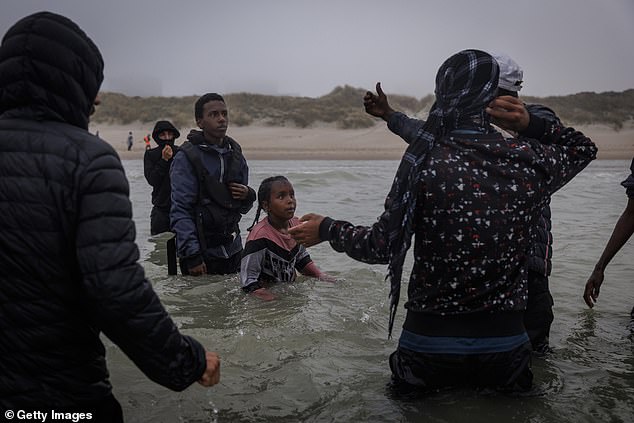
Two children try to make their way past alleged traffickers to a small boat but were unsuccessful in boarding and made their way back to the shore to try another day
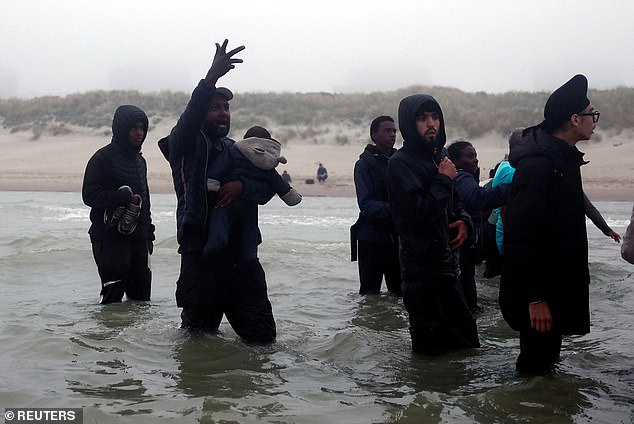
A man carrying a baby gestures towards the boat that would have taken them across the Channel
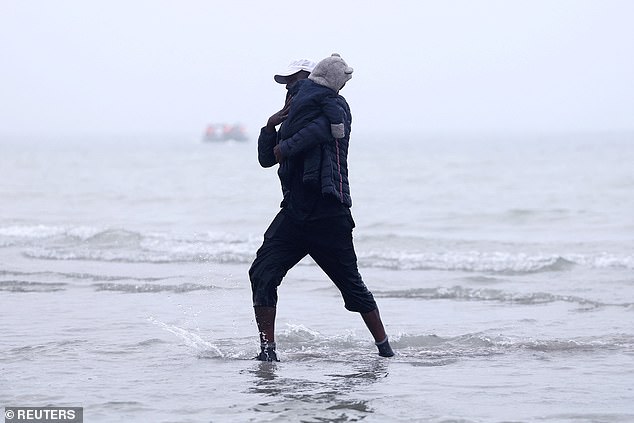
The man with the baby was forced to turn back as the crowded boat set sail for the UK without them
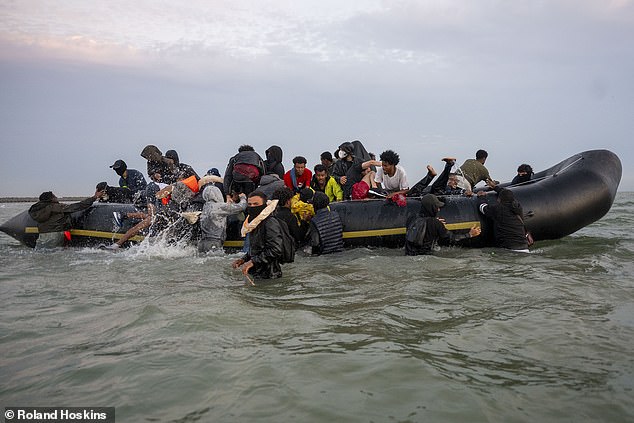
The alleged trafficker looks back as the rest of the migrants try to scramble on board
It was a startling question – because for more than a year Gravelines beach, between Calais and Dunkirk, has been a key spot for the now near-ubiquitous ‘taxi boat’ technique, where boats are launched at a quiet spot inland, then sail to the sea out of a waterway, such as Gravelines’ impressive canal, to pick up clients typically paying a little over £1,000 a fare.
And boats had left Gravelines on Monday, while on Tuesday the Mail had previously beat police to the scene of a migrant pick-up by a dinghy a mile inland here. We did not need ‘information’ that a launch would happen here – it was obvious one was likely.
The dinghy meanwhile seemed to be heading to England at 5.45am as we watched – but it soon turned back to shore, as we saw another group of around 30 migrants waiting at another spot around a mile to the east on the beach.
We and the officers hurried to the spot – but again many boarded unhindered, before this time it set off for England for good.
One officer, videoing, said of the group: ‘There’s a lot of children in this group. It could be dangerous.’
Another officer was less concerned, laughing as he said: ‘They will arrive in England soon – God save the King’.
By 6am the dinghy was heading to the horizon, followed eventually by a police motorboat, with a French military corvette hovering in the distance.
The four police – who said the first they knew of the dinghy was when they were radioed and told it had emerged from Gravelines’ canal – walked off the beach.
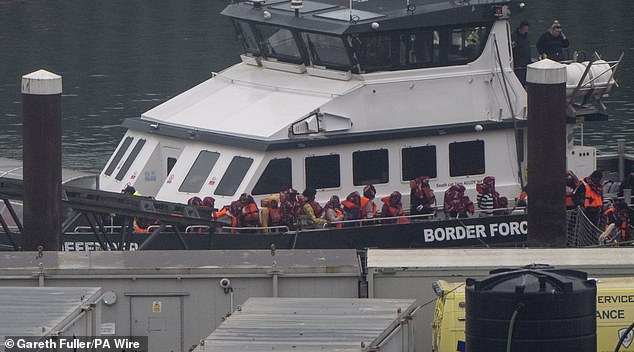
A group of people thought to be migrants are brought in to Dover, Kent, from a Border Force vessel following a small boat incident in the Channel
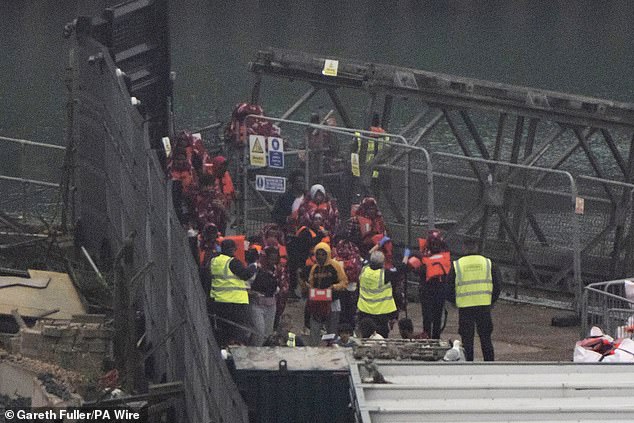
The crowds were seen disembarking still with their life vest on
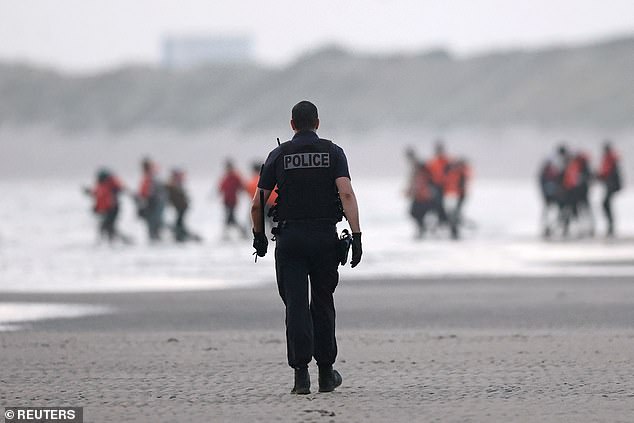
Earlier that morning, a French police officer walk was seen walking towards a group of migrants in life jackets running towards the water in the hope catching a ‘taxi boat’
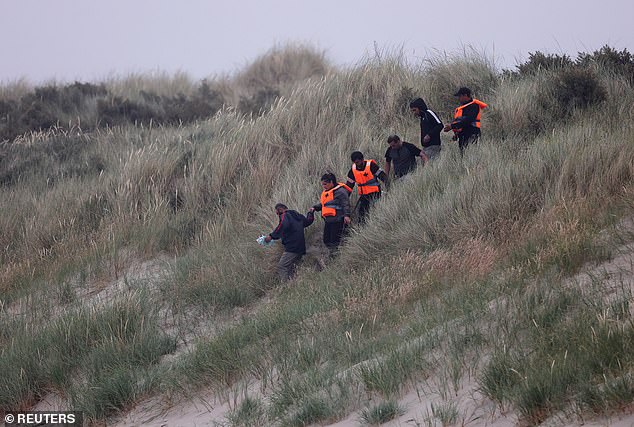
A group of migrants walk through the sand dunes to reach an inflatable dinghy
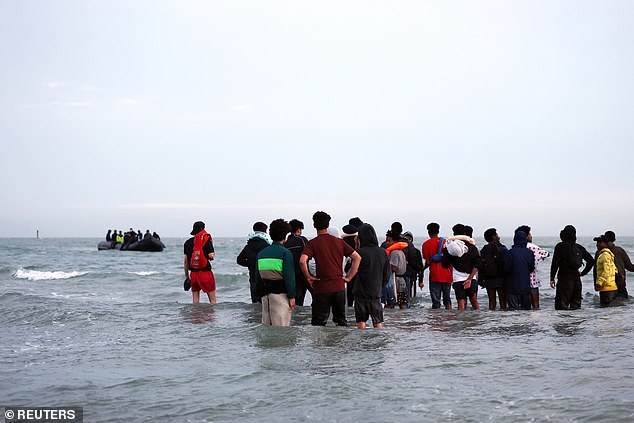
As the ‘taxi-boat’ dinghy pulled nearer, already half-full with previously collected passengers, the migrants waded into the water ready to climb aboard
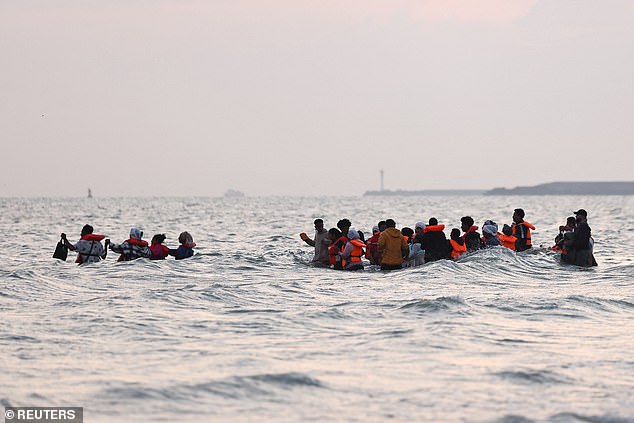
The migrants wade up to their chest to try and climb aboard
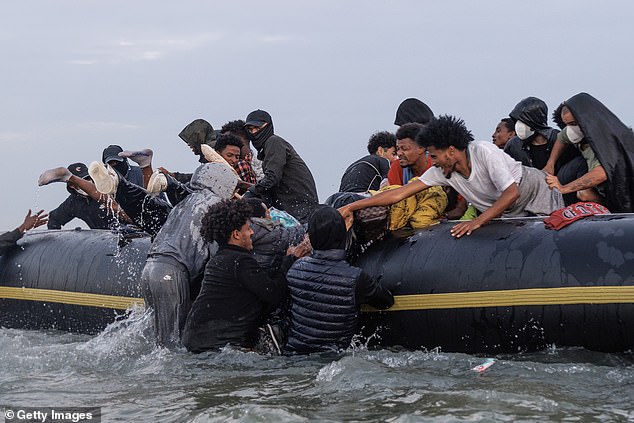
Migrants on board were seen helping people in the water as they tried to haul themselves onto the boat
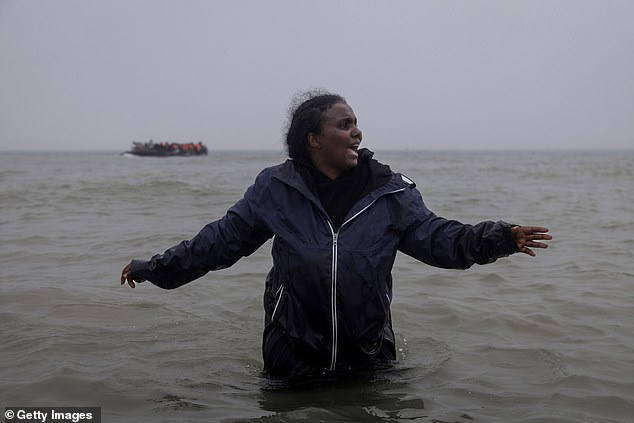
A distraught woman is devastated at not being able to get a place on the crowded small boat seen sailing in the background
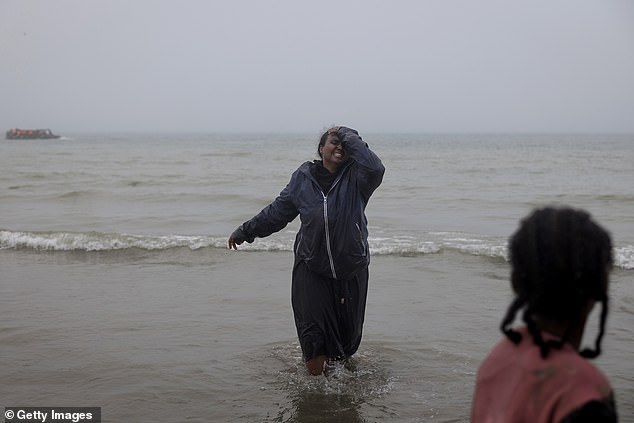
Overcome with devastation, the woman cries on the French shores after missing the opportunity to sail to the UK
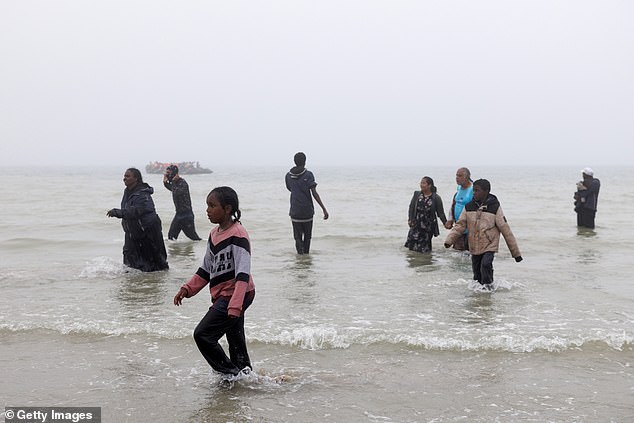
Families and children walk back to shore in the fog after failing to board a small boat
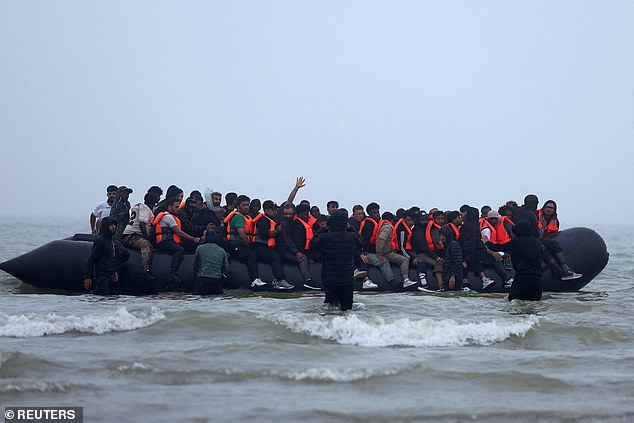
For those who did make it on board, they took a moment to pose for a photo, waving at the photographer on the shore
But the Mail did not believe it was over – and at 6.40am an entirely new group of migrants, maybe three dozen, suddenly emerged and walked openly along the top of Gravelines’ extensive dunes, some wearing bright lifejackets, towards the shoreline, all looking out to sea.
Clearly they had been told another dinghy was on its way.
Mist was falling over the sea, and ferry and shipping foghorns sounding as weather conditions took a turn for the worse – particularly for an illicit rubber dinghy – but soon that second taxi-boat arrived, again apparently from the Gravelines canal. Already maybe 20 migrants were aboard.
As it neared the shore, maybe a mile west beyond the last pick-up point of the first dinghy, and in front of a looming nuclear power station, the migrants came out of the dunes in tightly marshalled groups.
First ten at a time, then in several carefully staggered groups of six, they were sent to the dinghy in waist-deep water.
There, an organiser in a green hooded jacket stood in the waves ensuring those already aboard were grouped to the front of the rippling boat, so new passengers could pushed up by him, and pulled up by those helping in the dinghy.
Apparently full, with, naturally, no police in sight, the dinghy appeared to be heading for Dover – but it suddenly turned back, and we saw yet another group of migrants half a mile to the west back along the huge beach.
And this was a clearly a vulnerable group – an African woman with a young toddler to her back was particularly distressed as she ran through the waves towards the returning dinghy. She appeared to be successfully hauled aboard with her child.
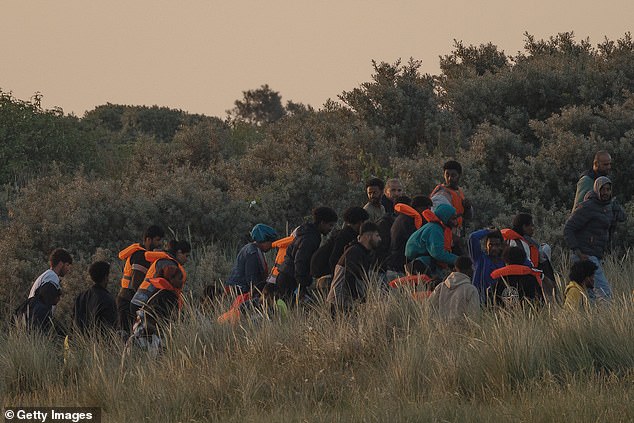
A large group of migrants emerge from the sand dunes before heading back in again as the police arrive
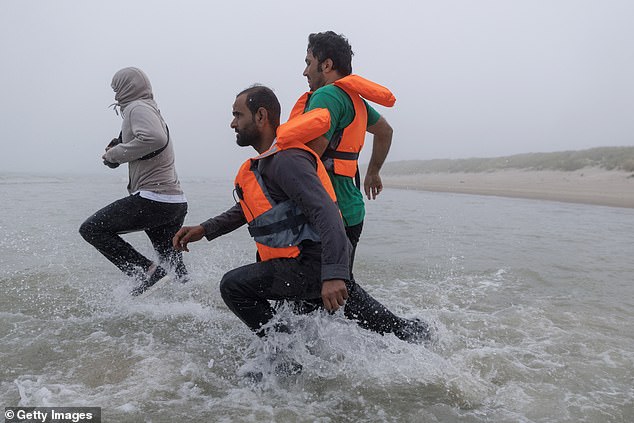
Migrants run into the water to be collected by a small boat in the fog early this morning
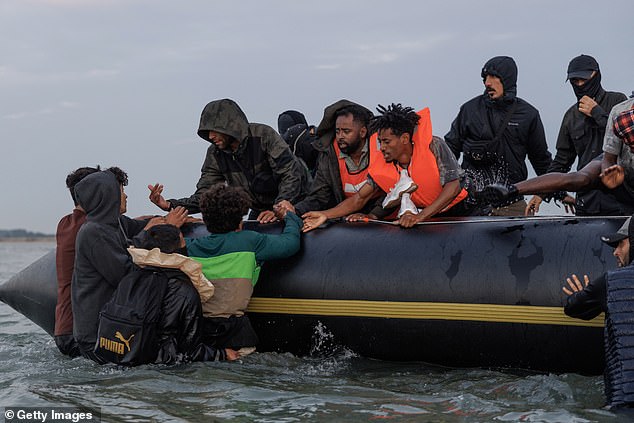
The latest scenes from across the Channel came as it was revealed that a record 20,000 small-boat migrants had reached Britain in the first half of this year.
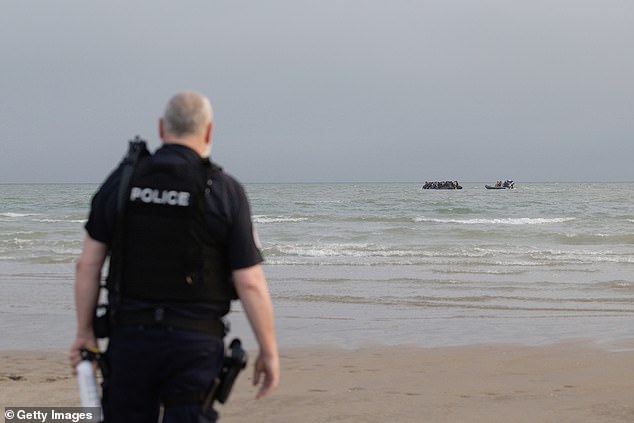
A police officer watches on as a Maritime Gendarmerie rib approaches a small boat full of migrants heading in to the English Channel
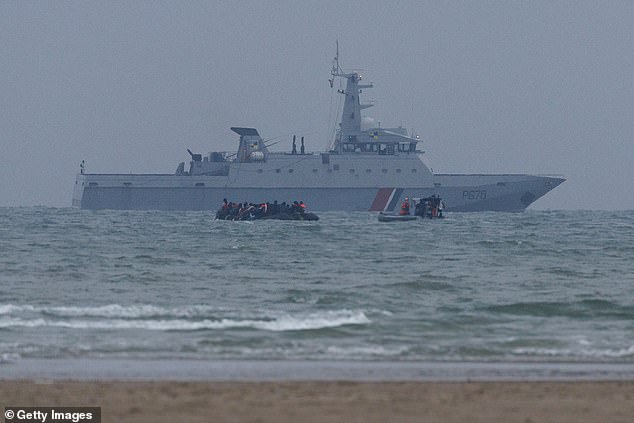
The frenzy to get out of the water and sail to the UK was in vain as minutes later the crowded boat was intercepted by French cops (a French war ship is seen in the background)
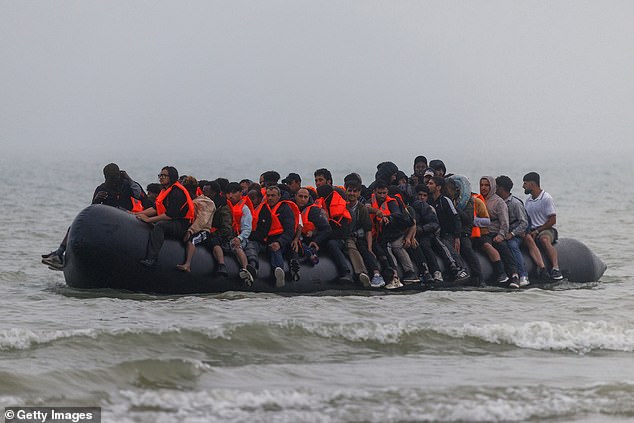
The crammed boat set sail from Gravelines in the fog this morning
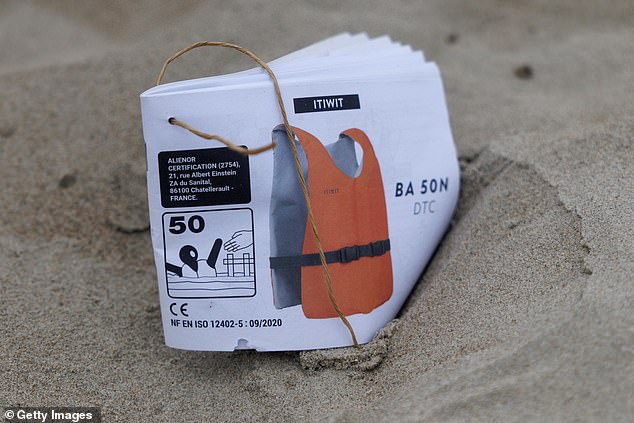
An Afghan man aged 25 was among those turned away ‘because I didn’t have a life jacket’
Behind her was a struggling group including another toddler, young children to two grey-bearded men in their 60s.
There were family groups, of parents in their fifties, with an adult child, the mother falling in the sea and crying as she was hauled to her feet.
Ultimately, the dinghy finally turned away for England, having taken only a small number of this final struggling group on board. Among those sat on the sides were several with only flimsy children’s toy rubber rings as utterly inadequate protection.
An Afghan man aged 25 was among those turned away.
He told the Mail: ‘They wouldn’t let me on because I didn’t have a life jacket.
‘But I want to get to England. I have no documents in France. Maybe tomorrow.’












